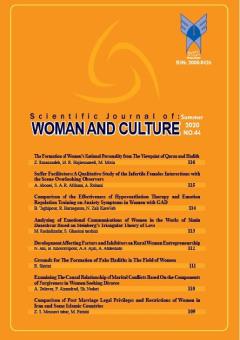The Formation of Women's Rational Personality from The Viewpoint of Quran and Hadith
Subject Areas : Sport ManagementZahra Razazzadeh 1 , Mohammad Reza Hajiesmaeeli 2 , Mahdi Motia 3
1 - Islamic Azad University Isfehan (Khorasgan) Branch, Department of Theology & Quran and Hadith Sciences, Isfehan (Khorasgan), Iran.
2 - Isfehan University, Department of Theology, Isfehan, Iran.
3 - Isfehan University, Department of Theology, Isfehan, Iran.
Keywords: Quran, Women, rational personality, Hadith,
Abstract :
The present research aimed to investigate the formation of women's rational personality from the viewpoint of the Quran and hadith. The research population was revelatory verses and analysis of Islamic narrations. The research sample was Quran verses related to the subject of education and women's wisdom, which, after reviewing, has investigated the formation of women's rational personality from the viewpoint of the Quran and hadith. Documentary and library methods were implemented to collect data. Based on the collected data, verses and hadiths related to women's rational education were reviewed and analyzed. The results of the study in the revelatory verses of the Quran and Islamic traditions showed that women's outstanding characteristics such as physical, mental and psychological characteristics that would depict different individual and social duties in their future lives were due to women's rational education. Such rational education was effective in shaping their rational personality. The mental and intellectual nurture of women benefited firstly, the development of their existence dimensions and secondly, the breadth of her thoughts and promotion in the new generation educating would lead to the progress of the society.
- قرآن کریم.
- باقری، خسرو. (1382). مبانی فلسفی فمینیسم. تهران: دفتر برنامه ریزی اجتماعی و مطلعات فرهنگی وزارت علوم، تحقیقات و فناوری.
- جوادی آملی، عبدالله. (1378). تسنیم (تفسیر قرآن کریم). چاپ دوم، تهران: اسراء.
- حرعاملی، محمد بن حسن. (1368). وسائل الشیعه. قم: موسسه آل البیت.
- خویی، سید ابوالقاسم. (۱۳۹۰). معجم رجال الحدیث. قم: مرکز نشر الثقافة الاسلامیة فی العالم.
- دیلمی، الحسن بن ابی الحسن محمد. (1424). ارشاد القلوب. ج1، طهران: دار الاسوة للطباعة والنشر.
- شریف الرضی، محمد بن حسین. (1414 ق). نهج البلاغه. محقق: صالح صبحی. (1395). قم: موسسة دار الهجرة.
- عطاران، محمد. (1380). دو رویکرد در تربیت دینی. قم: مجموعه مقالات همایش آسیب شناسی تربیت دینی.
- کلینی، محمد بن یعقوب. ( 328ق). اصول کافی . ترجمه استاد ولی. (1392). ج 1، قم: دارالثقلین.
- کلینی، محمد بن یعقوب. ( 328ق). فروع کافی. محمدحسین رحیمیان. (1388). جلد2، قم : قدس.
- لوبون، گوستاو. (1930). تمدن اسلام و عرب. ترجمه فخر داعی گیلانی. (1394). تهران: بنگاه مطبوعاتی علیاکبر العلمی.
- مجلسی، محمدباقربنمحمدتقی. (1386). بحارالانوار. چاپ 4، تهران: دار الکتب الاسلامیه.
- محمدی ری شهری، محمد. (1382). منتخب الحکمه، مترجم: حمیدرضا شیخی؛چاپ اول، قم: دارالحدیث.
- محمدی ری شهری، محمد. (۱۳۸۴). میزان الحکمه. قم: درالحدیث.
- مطهری، مرتضی. (1378). مجموعه آثار شهید مطهری. تهران: انتشارات صدرا.
- مهریزی، مهدی، جعفریان، رسول. (1390 ). موسوعة المرأة فی الأخبار و الآثار. ج ۱، تهران: انتشارات علم.
- نصری، عبدالله. (1394). مبانی انسان شناسی در قرآن. تهران: سازمان انتشارات پژوهشگاه فرهنگ و اندیشه اسلامی.
- نوری، میرزا حسین. (1408ق). مستدرک الوسائل و مستنبط المسائل. بیروت: موسسه آل البیت لاحیا التراث.
_||_

